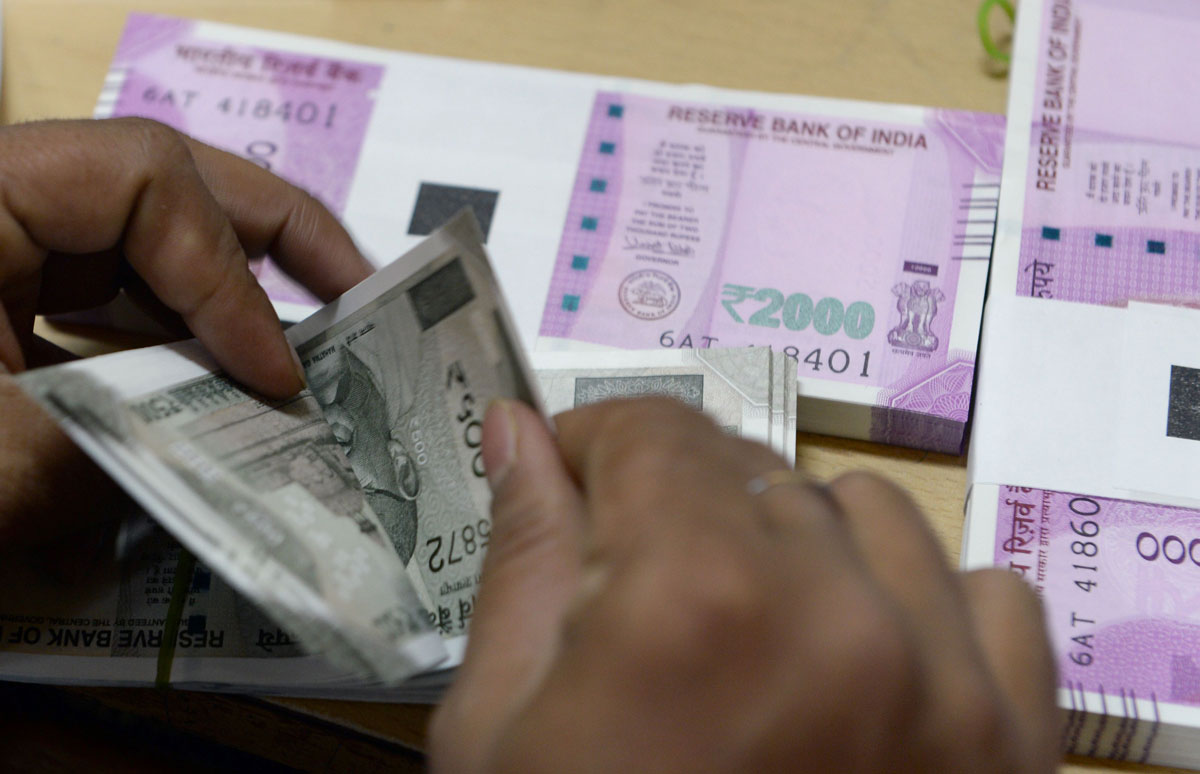WITHOUT NEW STEPS, DEMONETIZATION UNLIKELY TO BE BENEFICIAL SAYS GLOBAL ECONOMIST, EVEN AS DEPOSITS SOAR
A bank staff member counts Indian 500 rupee notes to give to customers, Nov. 24, in the wake of the demonetization of old 500 and 1000 rupee notes in Mumbai. The U.S. dollar hit a record high against the Indian rupee Nov. 24 as the greenback surges on expectations of a rate hike next month following Donald Trump’s shock presidential election victory. The U.S. currency bought 68.8625 rupees during early afternoon Forex trading, surpassing the previous high of 68.8450 recorded in August 2013. (Indranil Mukherjee/AFP/Getty Images)
India’s “sweeping change” in currency policy is unlikely to have lasting benefits without new measures to combat corruption and the move has resulted in “chaos” and “loss of trust” in the government, a top global economist has said, writes Lalit K. Jha. This while deposits in Jan Dhan accounts soared sharply by around Rs. 27,200 crore in just 14 days after the announcement of ban on old Rs. 500 and Rs. 1,000 currency notes. Meanwhile here in Silicon Valley, Siliconeer tried to reach the Indian Consulate in San Francisco for an update on the rupee demonetization and help available to NRIs in California. The Consulate has not responded to our phone and email queries as we post this article. – @Siliconeer #Siliconeer #narendramodi @namo #namo #India #Demonetization #IndiaNewCurrency #IndianConsumers #NRI #SanFranciscoIndianConsulate #IndianConsulate
“Like everyone else, we were surprised by the dramatic action taken by Indian Prime Minister Narendra Modi to demonetize the existing Rs 500 and Rs 1,000 currency notes,” Lawrence ‘Larry’ Summers, a former chief economist of the World Bank and ex-economic advisor to the U.S. President, said in a blog.
“This is by far the most sweeping change in currency policy that has occurred anywhere in the world in decades,” Summers said.
In his blog written jointly with Natasha Sarin, Summers said most free societies would rather let several criminals go free than convict an innocent man.
“In the same way, for the government to expropriate from even a few innocent victims who, for one reason or another, do not manage to convert their money, is highly problematic,” the blog said.
Moreover, the definition of what is illegal or corrupt is open to debate given the long-standing commercial practices in India, Summers added.
He and Sarin said there are also questions of equity and efficacy.
“We strongly suspect that those with the largest amount of ill-gotten gain do not hold their wealth in cash but instead, have long since converted it into foreign exchange, gold, bitcoin or some other store of value.
“So it is petty fortunes, not the hugest and most problematic ones, that are being targeted,” Summers wrote.
“Without new measures to combat corruption, we doubt that this currency reform will have lasting benefits. Corruption will continue albeit with slightly different arrangements,” said Summers, who in the past had advocated a similar measure for $100 and Euro 500 currencies.
“On balance, nothing in the Indian experience gives us pause in recommending that no more large notes be created in the United States, Europe and around the world. We were not enthusiastic previously about the idea of withdrawing existing notes from circulation because we judged the costs to exceed the benefits,” he said.
“The ongoing chaos in India and the resulting loss of trust in the government fortify us in this judgement,” Summers wrote.
Jan Dhan Deposits Soar by Over Rs. 27,000 Cr.
Deposits in Jan Dhan accounts soared sharply by around Rs. 27,200 crore in just 14 days after the announcement of ban on old Rs. 500 and Rs. 1,000 currency notes.
Total deposits in 25.68 crore Jan Dhan accounts crossed Rs. 70,000 crore mark and were at Rs. 72,834.72 crore on November 23.
As of November 9, total deposit in these accounts were Rs. 45,636.61 crore.
After the surprise demonetization of 500 and 1,000 rupee notes announced by Prime Minister Narendra Modi on November 8, deposits in Jan Dhan accounts have increased sharply to Rs. 27,198 crore.
However, 22.94% of 25.68 crore accounts still have zero balance.
As on November 16, 25.58 crore accounts with aggregate deposits of Rs. 64,252.15 crore were opened under Pradhan Mantri Jan Dhan Yojana (PMJDY) across the country.
With a view to increasing banking penetration and promoting financial inclusion and with the main objective of covering all households with at least one bank account per household, the Pradhan Mantri Jan Dhan Yojna was launched in August 2014.
Such accounts have a deposit limit of Rs. 50,000.
Earlier, both Prime Minister Narendra Modi and Finance Minister Arun Jaitley had cautioned people against misuse of Jan Dhan accounts for conversion of black money into white.
“We are getting some complaints that suddenly monies have popped up in the Jan Dhan accounts, so there is a misuse and that is why the rationing in initial days takes place,” Jaitley had said.
He had cautioned that the concerned departments will act if anything improper is found in the deposits.


